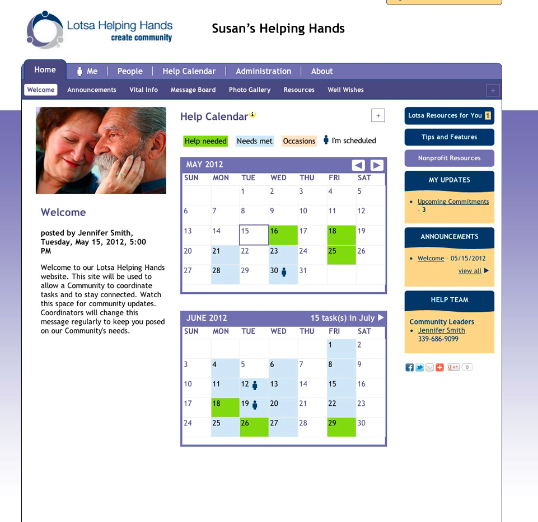Editor’s Note: I was impressed with Carina Lindquist’s post last week on ElderCare in Sweden and wanted to learn more about what was happening with elder care and mobile technology here in the US. I asked one of our distinguished contributors, Melody Wilding, who is a geriatric social worker and Director of Outreach and Strategic Communications at eCaring, if she would w
Editor’s Note: I was impressed with Carina Lindquist’s post last week on ElderCare in Sweden and wanted to learn more about what was happening with elder care and mobile technology here in the US. I asked one of our distinguished contributors, Melody Wilding, who is a geriatric social worker and Director of Outreach and Strategic Communications at eCaring, if she would write a follow-up post on elder care and mobile in the US. This is Melody’s excellent post. Thanks, Melody!
As the aging population surges, society is becoming more concerned with the care of its oldest citizens.
Sweden’s ParaSOL system, as described by Carina Lindquist, sets the stage for how countries with socialized medicine are using mHealth to track the care of elderly patients living at home. Paid caregivers — often government employees– use a smartphone device to log hours and document case details.
While Sweden’s case addresses the use of mHealth to meet administrative and regulatory needs, its missing a critical component of what gives mHealth its popularity and pull: mHealth’s unique ability to connect people experiencing similar situations.
Here in the U.S., caregivers are pushing the limits of mHealth and redefining its utility as they navigate the muddy world of elder caregiving.
Technologies like wireless sensors, social networking, and mobile devices are becoming the new standard in caregiving. The benefits of these technologies are far-reaching and have major implications for improving safety and quality of life for seniors, as well as reducing stress and bringing peace of mind to caregivers.
Long-Distance Caregiving
mHealth lets caregivers stay connected, even from afar. The National Institute on Aging estimates that over 7 million Americans are long-distance caregivers and this trend is likely to continue. According to a study by MetLife and the National Alliance for Caregiving, an average of 450 miles separates caregivers and their loved ones.
Technology can make long-distance caregiving a little bit easier, helping “share the care” between everyone involved. Lotsa Helping Hands is a free online tool to organize family and friends who want to assist with caregiving during a hospital stay or when the older adult returns home. The service makes it easy for caregivers to create “care circles” and post specific tasks that need coverage. Helpers can sign up to prepare meals, provide transportation, or run errands as well as a post messages and share photos.

Mobile health also supports caregiving by helping families and healthcare providers monitor care delivered in the home setting. Web-based care tracking programs enables families to monitor, 24/7, what is going on within an aging parent’s home from a tablet or smartphone. These technologies create a dashboard experience for caregivers. At a glance, families receive a comprehensive care portrait — behaviors and trends such as sleep patterns, vital readings, and even the person’s current mental state.
The Department of Veterans Affairs spearheaded one such government-sponsored initiative in May. They announced an mHealth program to provide 1,000 family caregivers with Apple iPad tablets to improve home care for veterans. The pilot “Clinic-in-Hand” project will implement a system of apps integrated with the VA data system to allow the exchange of health data between the department and families.
Social Connectedness
Today 8 in 10 caregivers have access to the web. As more baby boomers balance the demands of caring for an aging parent along with raising children, managing a career, and planning for their own golden years, time-strapped caregivers are turning to social networks for support.
Caregivers are leveraging the power of social media to create communities based on shared experience, support, and advice. Today 44% of online caregivers have read someone else’s personal health story online, while nearly 30% use sites like Facebook to connect over health-related tales (Source: Pew Research).
This vibrant community extends to the Twitterverse. #ElderCareChat is a bi-monthly Tweetchat that explores issues relevant to eldercare, including problems facing family caregivers and professionals, as well as topics around aging, senior care, boomer issues, and more. ElderCareChat was co-founded in November 2010 by SeniorsforLiving.com (@Seniors4Living) and Caregiving.com (@Caregiving).
Health Information and Organization
Increasingly caregivers are turning to mobile technology to bridge the gap between lessons learned “in the battlefield” and of that provided by medical professionals.
In fact, caregivers are more likely than any other group to scour the web for health information, from looking up treatments and facility ratings to researching end-of-life decisions. That’s because accessing health-related information and care management tools via mobile devices allows caregivers the flexibility to accommodate ever-shifting schedules and responsibilities.
Smartphone apps for caregivers worthy of mention:
- Elder 411 and Elder 911 (Free) – From Dr. Marion Somers, Elder911 provides critical tips and information for emergencies like a fall or sudden illness. Elder411 features a huge library of answers to caregiving problems and elder care situations.
- WebMD Mobile (Free) – Similar to the browser version, WebMD’s mobile app includes symptom checklists, treatment information, and first aid instructions. The app’s most useful feature is the “Pill Identification Tool” which helps ID medications by pill shape, color, and imprint.
- Caregivers Touch ($4.99) – This app helps caregivers organize all of a loved one’s pertinent information in one place, including appointments, medical history, insurance information, and much more.
Watch the video below for more information on LotsaHelpingHands:
Are you a caregiver? How has mHealth helped you?
To read other posts in this exclusive ongoing series, please visit the Mobile Health Around the Globe main page.
And if you have a Mobile Health Around the Globe story to tell, please email me at joan@socialmediatoday.com